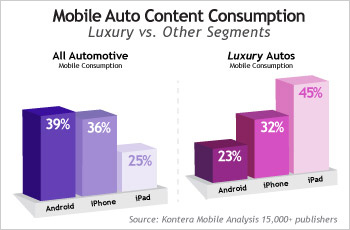As the increase in tablet adoption makes clear, tablets today are no longer “novelty gadgets,” but rather tier one mobile devices, comprising one-third of all mobile content
consumption. One of the most striking discoveries is the effectiveness of tablet marketing in reaching affluent consumers. We also see the inherently engaging tablet platform as particularly well
suited for evoking lifestyle benefits – staple tools for luxury brand marketers.
When looking at luxury content being accessed via mobile devices and consumers’ mobile
research patterns within luxury product segments, we consistently see tablets, and the iPad specifically, commanding a disproportionately large share.
As just one example,
let’s look at consumers’ mobile content consumption of information about cars. When viewed as a whole, we see a usage pattern that is predominantly smartphone driven (75%), with iPads only
accounting for 25% of content consumed. However, when we isolate luxury automotive content, by looking at detailed page contents, we see a dramatic reversal. The iPad becomes dominant with nearly half
of the mobile consumption of the luxury segment coming from this one platform.
advertisement
advertisement

If
you are an automotive marketer, trying to appeal to luxury buyers by weighting platforms evenly, or favoring smartphones, then you are missing your audience.
We see this exact same
pattern unfold in other product categories and domains. Those of us who fly often and spend many days traversing airports are bombarded by billboard ads for Oracle, SAP, Accenture, and so forth. The
marketing rationale behind these billboards is that senior corporate executives, who are business software decision makers, will be influenced by these display ads during their travels. Several weeks
ago, I wanted to see if these same senior executives could be reached via mobile devices.
When we examined the mobile content consumption patterns of IT as a whole we found that 44%
are using Android smartphones, and tablets are again just 25% of the usage. However, mobile content specifically regarding business software packages like Oracle Financials, Salesforce CRM, and SAP
manufacturing is consumed on iPads 42% of the time, with Android phones comprising just 25% of consumption. The coveted business executive, the VP of Sales or Procurement, is much more likely to be
using an iPad than an Android smartphone.
Tablet ownership and usage is more widespread among affluents than any other income group, and those numbers are growing very fast. Ipsos MediaCT saw in July 2012 that 26% of affluents owned a tablet and 47% lived in a household that had tablet in it. comScore MobiLens saw similar figures (27% of affluents owned tablets) around the same period.
The comScore study also observed tablet ownership increases as the consumer’s income bracket increases. And for users ages 35 and over, a Flurry study from September found tablet ownership
is more widespread than smartphone ownership. This means that for brands targeting affluents (and in particular consumers who are older and making more household buying decisions, with more money to
spend on them) — automotive, travel or luxury brands, for example — their audience is already on the tablet in full force.
This brings us to a fairly significant
“bonus” engagement feature available on tablets, for marketers seeking to reach Affluent consumers. Most luxury products are differentiated by their lifestyle impact on the consumer. The
emotional appeal of luxury products is often created by connecting with consumers’ lifestyles and aspirations. Rather than marketing product features and price point, luxury marketers command a
premium for their products by evoking “priceless” benefits like elegance, excellence, quality, solitude, and so on. Today’s tablets benefit from an inherently immersive interface,
and rich, interactive, magazine-like, full-page ads, and therefore are best suited to convey the lifestyle and aspirational message and content.
We are increasingly hearing of
companies adopting “mobile first” in terms of future directions. For those of us seeking to reach an affluent audience the “tablet first” marketing plan may be even more
relevant.